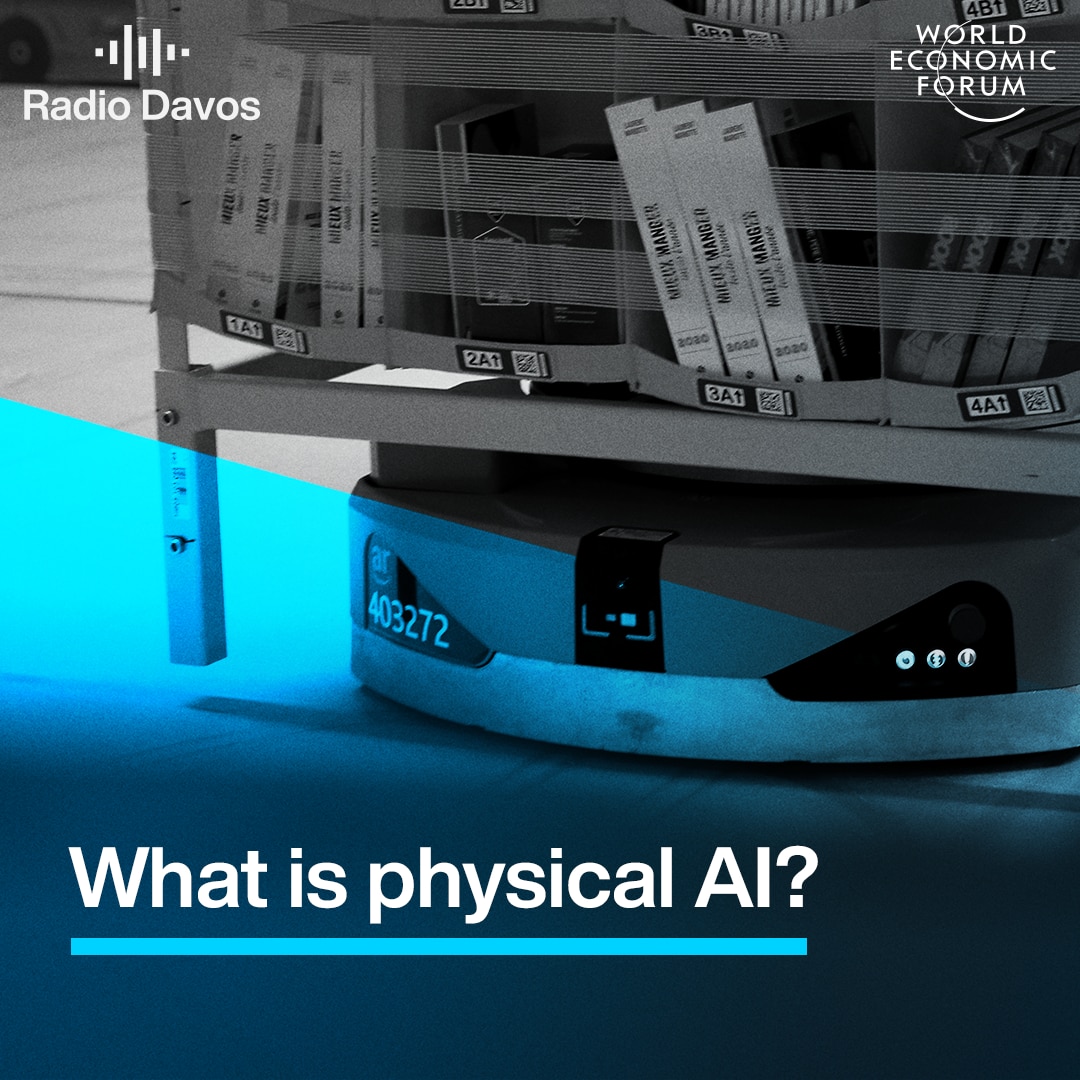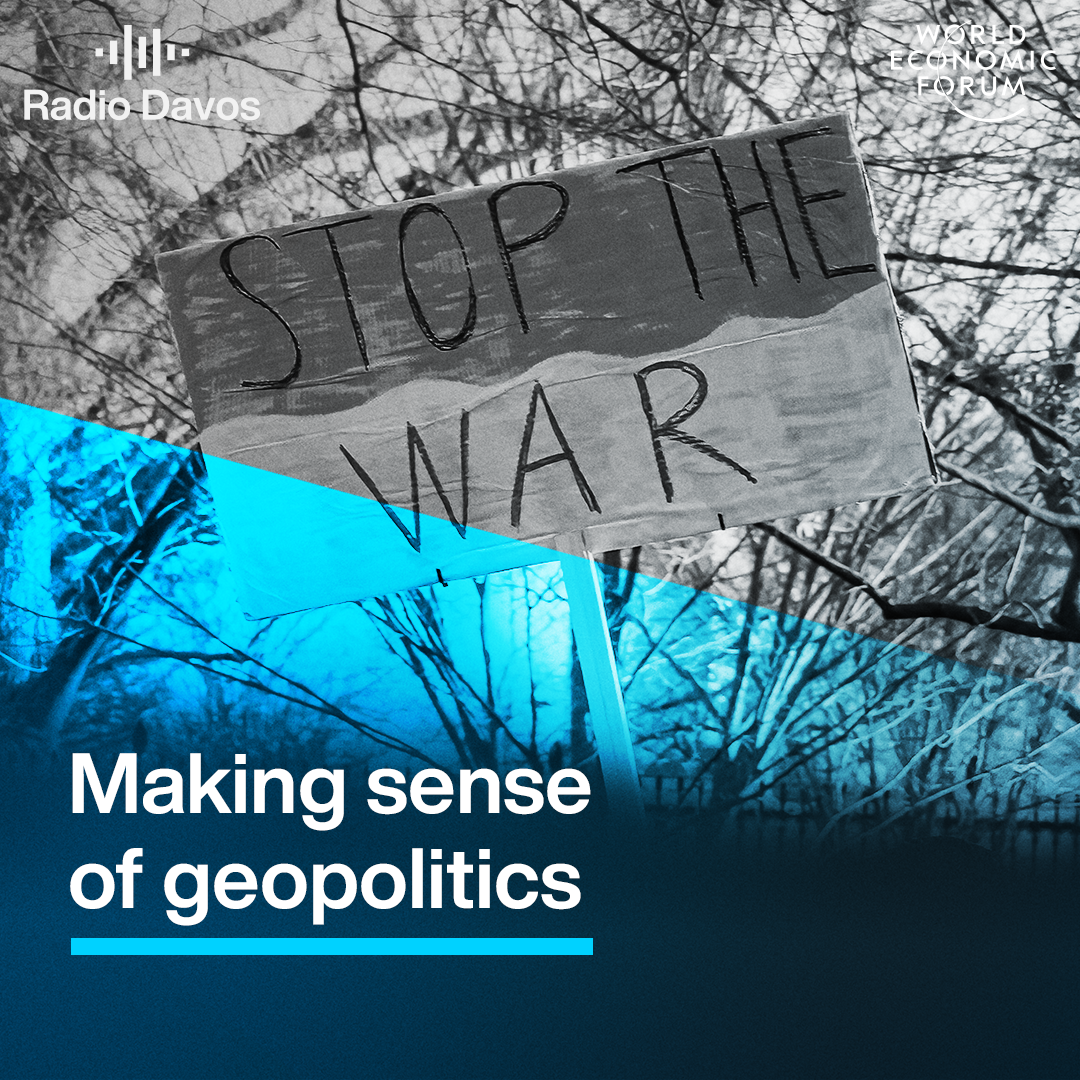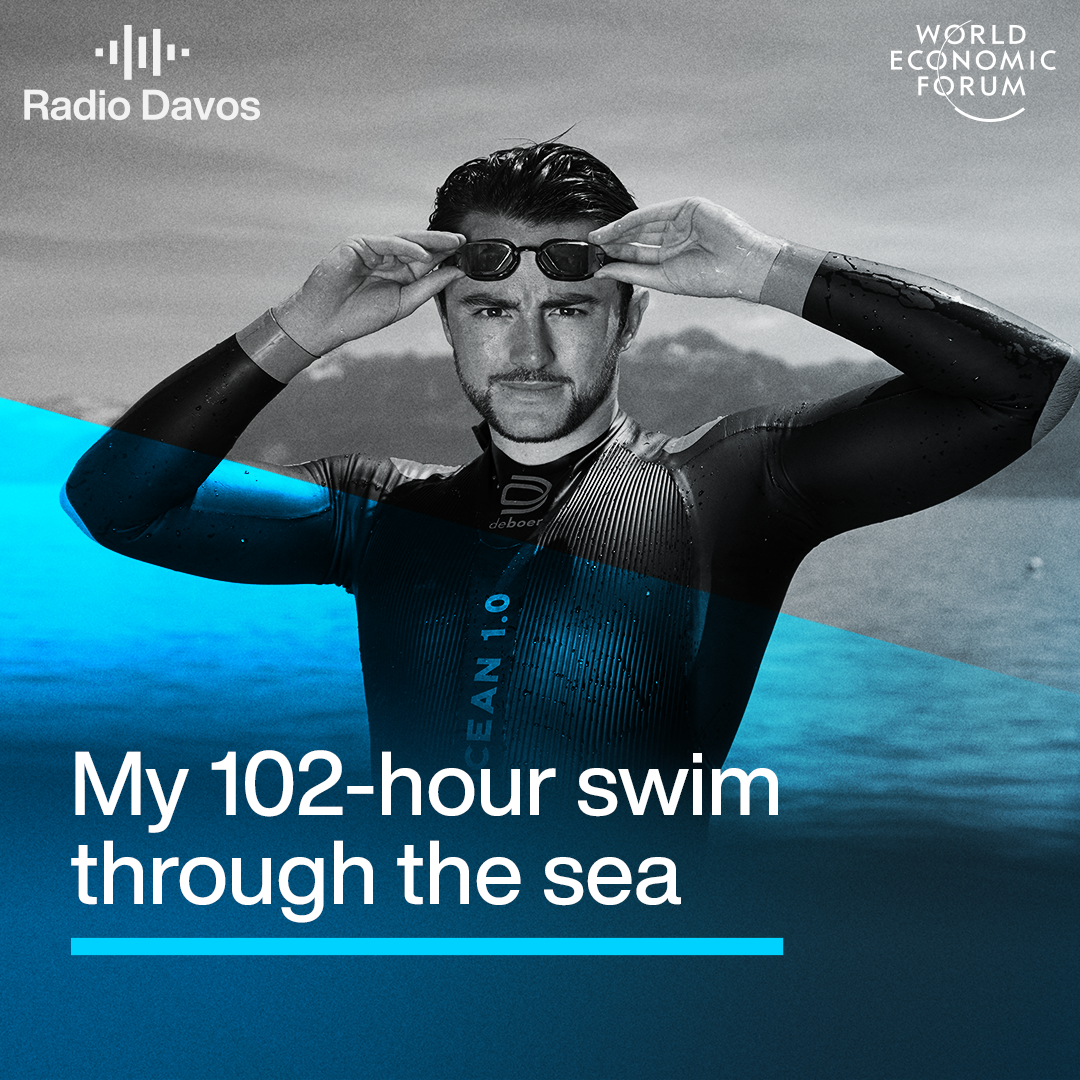How chemicals companies are joining forces to become more sustainable
Transcripción del podcast
Hella Koops, Senior Project Manager and Cluster Lead Circular Plastics, TNO: I'm a chemical engineer by background and I worked in engineering for a long time in the chemical industry. At some point, I decided that climate change is evident and we need to drastically change the industry.
Robin Pomeroy, host, Radio Davos: Welcome to Radio Davos, the podcast from the World Economic Forum that looks at the biggest challenges and how we might solve them. This week we look at an industry that produces something like 6 percent of greenhouse gases globally, and ask what are companies in the chemicals sector doing about it
Charlie Tan, CEO, Global Impact Coalition: The chemical industry as a whole knows that it needs to decrease its overall emissions by approximately 60% by 2030.
Robin Pomeroy: Some of the world’s biggest chemicals companies have joined forces to seek ways to do that. We hear how and why.
Charlie Tan: Meeting these targets require us to be really transformative in the approach. If any one company could have solved all of these issues, they would have done it already, right?
Robin Pomeroy: We hear from scientists seeking new ways to manage plastics.
Hella Koops: We've banned now plastic bags, single use plastics, but there's a lot more applications that we tend to forget about: construction material for cars, planes, houses Plastics is applied in textile. People tend to forget that plastics have a really broad range of applications beyond packaging.
Charlie Tan: We need really to have a collaborative approach in order to get this done.
Robin Pomeroy: Subscribe to Radio Davos wherever you get your podcasts, or visit wef.ch/podcasts.
I’m Robin Pomeroy at the World Economic Forum, and with the look at how the chemicals sector is collaborating to improve sustainability…
Charlie Tan: I think the saying is to go fast, go alone, to go far, go together. And I think those who opt to go far will be the companies that actually we all still recognise in 100 years from now.
Robin Pomeroy: This is Radio Davos
The World Economic Forum is a place where stakeholders come together to seek answers to big questions - better ways of doing things - solutions to big problems. There are many examples of how collaboration projects that start at the Forum go on to become organisations in their own right, and one of the latest examples of that is the Global Impact Coalition. The GIC is a collaboration of some of the world’s biggest chemicals manufacturers who are pooling their resources to seek ways of slashing pollution and climate change emissions.
Later in the show we hear from Charlie Tan, its CEO. But first, I spoke to a couple of technical experts at the Netherlands-based research organisation TNO which is home to a Research and Development Hub that is working with the Global Impact Coalition to find ways of making plastics more ‘circular’ - that is reusing and recycling products that in the past have been thrown away.
Hella Koops is TNO’s Senior Project Manager and Cluster Lead Circular Plastics, we hear from her in a moment. I started the conversation by asking her colleague Jan Harm Urbanus, the Lead Scientist on Circular Plastics, what exactly we mean by ‘plastics’ and how did they become so ubiquitous.
Jan Harm Urbanus, Lead Scientist Circular Plastics, TNO: If we look at the history of plastics. There was a nice competition in 1870 by a company that produced billiard balls. And they made them from ivory first. They thought this material was too expensive. So they said we promised grant of $10,000, which was a lot of money back then for the company that could produce synthetic materials for these balls. There was a first, let's say, artificial plastic that was was used.
That's where it started. And then around the start of the 20th century, more and more materials were being developed, inspired by this first invention. And also due to the world wars, there was a lack of these natural materials. So people started to invent new materials based on fossils to replace basically the natural materials that were being too costly.
And here we are in with currently 400 million tons of plastic being produced and used every year. So if we would make a queue of trucks filled with 20,000kg of plastic, right, it would go 3 to 4 times around the globe.
Hella Koops: Obviously plastics, they are starting to get more bad press and bad reputation, which is mostly based on its application in packaging because it creates a lot of plastic littering when people throw away things out there.
And we've banned now plastic bags, single use plastics, which I think is good, but there's a lot more applications that we tend to forget about. It's applied in construction material for cars, planes, houses Plastics is applied in textile. It makes for stronger and lighter fabrics that dry more easily.
That's something people tend to forget. The plastics have a really broad range of applications beyond packaging. And even in packaging it is a really good material with light and strong properties. If you compare a glass bottle to a plastic bottle, it doesn't break during transportation. It's just a lot lighter, so the carbon impact of your transport is smaller. There is just a lot of good things about plastic. We need to keep on weighing the advantages and disadvantages for all of the applications, but we shouldn't just ban plastics for itself.
Robin Pomeroy: So what is the brief that you've been given by the Global Impact Coalition? What ideas are they looking for?
Jan Harm Urbanus: If we look at the current plastics usage, it is quite a linear value chain. So we we make plastics, we use them and we dispose them. And disposing could be ending up in landfill or could be incineration. But in the end it's not being used again.
Recycling is actually trying to close the loop. There are multiple techniques and also multiple materials. So it's not just one thing that we can do. And within the Global Impact Coalition we basically target those currently difficult to recycle plastics. And we develop new strategies that could help the companies involved to, in the end, implement them and apply them for these materials that are currently still sent to the incinerator or being landfilled.
Robin Pomeroy: So looking at recycling of plastic, there's easy plastics to recycle. And there's difficult ones and maybe impossible ones. Can you give me a kind of just an overview of what the situation is?
Jan Harm Urbanus: Currently, it's nice to give an example of how plastic actually travels right along this value chain. So imagine we have a plastic bottle. And this plastic bottle after use ends up in the bin, it's being collected. Then there's a sorting plant which basically sorts on objects. So it's sorts out the bottles from the trays, for instance, or buckets. And then with this separate stream of bottles they will be sent to a recycler that melts them. And then from the melt the plastics tries to produce new plastic.
In society we have indeed simpler plastics that are easy to recycle. Then we have consumer packaging, which is a bit less simple but still quite okay. Separate collection of plastic is difficult because of the space it will consume. So plastic is just being disposed of with all the other materials that we use, and it's difficult to then separate the plastics out of the total waste and thus it gets incinerated.
And if we didn't talk about other plastics that are, for instance, used in construction or automotive, these follow different pathways. Again, sometimes these are already in place, but in other cases these also end up in landfill or in the incinerator. And those are then also more difficult to recycle because these are much more composite materials than the single bottle that we just discussed.
Robin Pomeroy: So your research then, trying to find better ways of doing this, ehere do you come in on that kind of value chain.
Jan Harm Urbanus: What we are looking at in the Global Impact Coalition R&D Hub is both the sorting and also the recycling. We focus on innovative techniques to be able to sort and separate different plastic products.
Robin Pomeroy: So what kind of what kind of innovations can you do for that? Because you picture someone, a human, picking through waste and pulling out the things you're looking for. Are there more innovative ways of doing it?
Jan Harm Urbanus: Certainly so.
Hella Koops: Many.
Robin Pomeroy: I hope so.
Jan Harm Urbanus: So that is one way that plastic waste can be sorted. Sorting devices already exist that use, like an eye, using infrared sensors. And this eye then detects what is the type of plastic that we are looking at. So the different polymers and we have like nine big types of polymers. And this eye can then detect the differences between them and then gives an instruction to a device that uses air to separate the one object from the other.
We are trying to improve this eye, detecting different materials. But the problem with a difficult recycled materials that we're looking at is not just one polymer type, it is a composed products. It has more than one polymer it. So it's a multi layer material for instance that you would like to detect. And if we look at the current way this eye operates is it just sees just one end of the of the products but not the other side of it in the same time. So we're trying to use different techniques than infrared to improve this and then also improve the, the selectivity, let's say, or the purity of the streams that come out of this device.
Hella Koops: These projects are part of a larger programme. And what we've been doing with the seven industrial Hub members is defining this programme based on what are the most urgent needs for them. What is their joint need for fundamental research?
In this process, we've jointly defined the final four projects that are now being executed, based on the highest priority for all of the members. So that I think in itself is of value, because if you bring seven of these large petrochemical companies together, and they jointly define the priority, you have the right one, in my mind.
Robin Pomeroy: Can you tell us what those four kind of fields are?
Jan Harm Urbanus: From the onset, we defined two types of challenges that we should work on. One of the challenges is to improve the sorting, as I just explained. And the other one is to improve the recyclability of difficult to recycle materials. And then the four projects are basically distributed over those two main challenges that we have defined.
Robin Pomeroy: What about the cost of all this? You could come up with great techniques and processes to make this happen. This seems to be one of the challenges of plastics recycling: virgin plastic feedstock is pretty cheap, and it's easy to work with, and the factories that have been working with it for decades. It's a lot harder, more expensive, isn't it, to deal with recycled plastic? Does that come into your work? Or are you presenting it as, here's some great ideas. You work out the economics of this, when you give it back to those companies.
Hella Koops: I think the the nature of the work that we're doing within the R&D Hub is such that it's it forms the base layer of research that all these companies need. And from this baseline research, they all develop what they individually need.
And you're right that currently the virgin plastic production is a lot cheaper than recycling. That has to do with the history of the technology development. It has multiple technologies that have been improved over years and years over decades. And that brings the cost down.
So with some of these new techniques in recycling, we're in a pioneering stage and we need to set up first lab facilities, then pilot plants facilities and then moving on to commercial scale production plants.
These are not the most optimal solutions yet. They need to be further refined and optimised over the coming years. And that means that over the years the cost will go down, it will reduce, but it takes time. It hopefully takes less time than it did for virgin plastics, because we are in a hurry and we need to have sound business cases for companies, but that is a struggle.
Robin Pomeroy: The bad press that plastic gets is often due to ocean pollution. There's another element to plastics impact on the environment, and that's climate change. This is fossil fuels being used to create these things. Will your research help trying to get to net zero? Are there things you're doing that you think will help achieve that goal?
Jan Harm Urbanus: Certainly. So generally if we look at recycling, that in itself has a big contribution to net zero. In the end it is about trying to develop the best recycling techniques so that this impact is the largest. If we would not invoke this path of recycling, we would only be able to either use fossil still, or we need to look at renewable resources, and that requires more than we currently have on this planet. So recycling is effectively needed to move away from fossil.
And often what we see, for instance, in packaging, is that people try to move away from plastics. So even if we look at recycling of plastics versus the use of paper or cardboard. Plastics in that sense are better, especially because it's impossible to use paper packaging as such for liquids. You always will need a coating in this coating that in the end also is derived from fossil. So plastics in that sense are the better solution. And we have to mitigate climate impacts and also pollution. But the circular strategies that we are developing contribute to that end.
Robin Pomeroy: Can I ask you on a personal level, both of you, what kind of inspires you to do what you do?
Hella Koops: I'm a chemical engineer by background and I worked in engineering for a long time in the chemical industry. At some point, I decided that climate change is evident and we need to drastically change the industry. So I'm intrinsically motivated to work on that. So a lot of research is needed and needs to be translated into a whole new industrial ecosystem, and everything that can contribute to that I feel passionate about.
Jan Harm Urbanus: For me, I just love nature. That is, I think it's beautiful and we need to protect that. We ought to have stewardship on what we have here on planet Earth, and especially for the next generations to come.
I have three kids, and I want them to be able to also enjoy nature, as I have been doing so far. And working on innovative techniques that help us make an impact in this transition to net zero, is really, for me, the inspiration.
Robin Pomeroy: Is there a point on the horizon where you or the Global Impact Coalition or society in general, will be able to say, we've crossed the threshold here, we have now made plastic significantly more sustainable. Is there going to be a crossing the Rubicon moment?
Hella Koops: I'm afraid it will be a slow and painful process, but we have a clear targets. Like for 2050, we need fully circular plastics. And to meet that stage, the dot on the horizon that we work together towards.
Robin Pomeroy: So fully circular means when it's made, it's never thrown away.
Hella Koops: Fully circular in the end will mean we will recycle plastics for as long as possible. What is being lost during the process will be made up by bio-based plastics, and bio-based in itself is also a circular feedstock or it means circular feedstock is being used. In that definition of circularity we will achieve it.
Not for the throw away, what I mean is during the recycling process there are inherent losses. Along the way you will lose a certain percentage of the feedstock because you never have a 100% efficient process. So you make up for the losses with bio-based plastics.
Robin Pomeroy: You set a timeline for 2050 there Hella, Jan Harm, in the meantime, are there more medium-term goals? What's going to happen on the journey towards 2050?
Jan Harm Urbanus: In the meantime, a lot of scale up still needs to happen. And not just scale up, but also if we look at the complete value chain, we need to have all the actors in place. We also need to have legislation and policy that helps. So we talked about recycled plastics being too expensive, but we just need to create incentives, like we are also doing for biofuels for instance. And if we create such incentives, then there will be a market for circular materials. And that enables the scale-up of technologies.
So we need demonstration plans that are being established these years. But we also need their next steps, the full commercial facilities. And if we are taking those steps along the path, I believe the coming 5 to 10 years will be crucial, and determining the fate of the rest of the steps to take til 2050.
Robin Pomeroy: The Global Impact Coalition is a coalition of currently seven very big companies that are involved in the manufacture of plastics. They're coming together, kind of pooling their resources to fund this research. Hella, why is that important?
Hella Koops: First of all, it's a cost benefit, of course, for them because they share the burden of the research cost. But also I think the programme and the projects are better defined that are prioritised because it's a joint effort.
And then I think during the research itself, the execution leads to better results because we keep in touch with the representatives of these companies and they provide feedback to the programme, they provide feedback to certain results. They provide industrial samples where needed.
So there is much more dialogue on what is going on in the programme and what is being achieved. There is more steering and the feedback loop is better, and I think that leads to higher quality results in the end for the overall programme, which is also benefit then to everyone.
Robin Pomeroy: Hella Koops of the Netherlands-based research organisation TNO. They are running the R&D hub for the Global Impact Coalition. To find out more about the GIC, I spoke to its head, Charlie Tan.
Charlie Tan: The Global Impact Coalition is essentially an enabling and an execution platform for the chemical sector to come together to work on fundamental, key industry challenges regarding net zero circularity that just cannot be solved by any one company alone.
So through the platform, we take global topics such as plastics circularity, and with our members who are some of the world's leading chemical companies, we basically take a collaborative approach towards developing more innovative solutions to address these climate challenges.
Robin Pomeroy: Can you tell us something about the origins of it? Because this started at the World Economic Forum.
Charlie Tan: Yeah. So this is a coalition that was created at the World Economic Forum. And so I was at the Forum to essentially build and develop the initial phasing of this before we spun it off into an independent entity around 7 or 8 months ago.
So I would say that the Forum has really been crucial in playing a convening role. I mean, obviously the Forum is very good at playing this role between public, private, cross-industry to really sort of make sure that change can be effective in many different areas.
Specifically for this, it was really within the chemical industry as sort of being one of the top, I would say, heavy industry greenhouse gas emitters. So it accounts for around 6% of global greenhouse gas emissions. Something had to be done. And I think that in order for this journey to be sort of kickstarted, it needed the right platform that the Forum was sort of able to to provide in this space.
Robin Pomeroy: Big, heavy industries with big plants producing products that basically everyone at some point uses. Why are they not able to go it alone on this? Why can't each of those companies just say, right this, we'll do our own research and development, our own innovation on this? Why is that collaboration so crucial?
Charlie Tan: I think, first of all, if I just take a quick step back, I mean, if you look over the last couple of years, it hasn't really been an easy time for the chemical industry in general. I mean, since around 2020, we've experienced everything from sort of soaring inflation to supply chain disruptions, weakening demands, obviously the broader geopolitical landscape. These conditions have really created very tough challenges for for all chemical companies, and particularly for sort of global companies with energy intensive operations.
A bit of data in parallel to this, the chemical industry as a whole knows that it needs to decrease its overall emissions by approximately 60% by 2030 if we are to meet this sort of one and a half degree pathway which everyone is talking about.
So the premise is really that, yes, companies, of course, are developing things alone, but it's not enough. When we talk about moving the needle on sort of industry decarbonisation, especially at speed, which is what we would need to do if we are to meet these goals that we've set, we need really to have a collaborative approach in order to get this done.
Robin Pomeroy: And what's that been like, bringing together what are very often competitor companies to actually collaborate on something like this?
Charlie Tan: I think it's very important that we're able to bring the industry together. I think that there have been, frankly speaking, some big challenges in doing so. Now that the industry is sort of coming out, hopefully, of the downturn, there is actually huge opportunity to transform how the industry goes on this journey towards net zero, as you mentioned, not as one company in isolation, but really together as an industry.
And and why is this important? It's important because fundamentally industry challenges towards driving decarbonisation, the circularity goals, especially in meeting these targets, require us to be really transformative in the approach. If any one company could have solved all of these issues, they would have done it already, right? But they haven't. So this is essentially the platform that we are providing the industry.
Now, coming a bit to the question on the challenges of this, of course, like any industry bringing together global companies who are in some areas competing strategically, this isn't easy. And this requires, I think, first of all, the adoption of a new mindset. So both internally for each company, which is usually sort of from the top down, but also a mindset from an industry perspective.
I think the question I always think about when we talk about sort of bringing together giants of industry to work on, on these pressing challenges, it's less sort of what are the challenges, but it's more what is the cost of actually doing nothing? What is the cost of inaction and the cost? In my view, is is really exponential.
Another challenge that I think is something that we've had to overcome is really around transparency, to be honest. So especially when dealing with industry peers on big topics, it's the whole, well, how much am I sharing compared to what you plan to share? So for me, one way to help address this is really to come to an early alignment on what are the target outcomes that would take this project or business case from A to B. Now, how do we collectively protect our downside? And what are the overarching rules of engagement that we all have to adhere to?
These are basic but fundamentally important questions to answer. And they set the tone not just for moving things forward at speed, but also in making companies feel comfortable that their efforts and levels of transparency really match.
Ultimately, companies have to be willing and want to work together, which is really crucial. I feel that the more forward thinking companies do realise now that joining efforts as an industry is a good strategy, not just from a sustainability perspective, but also from a business perspective.
I think the saying is to go fast, go alone, to go far, go together. And I think those who opt to go far will be the companies that actually we all still recognise in 100 years from now.
Robin Pomeroy: And we've seen how that is working with the research and development hub that these companies are pooling their resources through you to really get some fundamental research going on. Are there other things you're working on as the GIC?
Charlie Tan: Yes, so we're working on a lot at the moment. We have a pipeline of around 20-plus projects at any one time. To give you an example of one of these, we're looking at end of life vehicles that are around 1.5 billion cars on the road. Cars are currently not set up for circularity, so they are not made to be easily recycled at the end of life, at least not for the plastics, which means that with only one car, when it comes to the end of life, it has around 50 different plastic fractions in it which are actually just taken apart and just incinerated at the moment. So they're burned essentially. So bumpers, the carpeting, the seats, upholstery, the dashboards and so on.
So why is that? Why is all of this being incinerated and not recycled? In short, the reason is because there's just no current business case in place to support anything but incineration. So there are currently high costs for dismantling. There are inefficiencies in sorting technologies. There's a lack of knowledge to recover the right plastic fractions and so on. So this is a big inherent problem, and it's clearly one that cannot be tackled by any one company alone. So this is exactly why we, as a consortium of companies under the Global Impact Coalition, are looking to solve this.
This is a project that will anyway not involve just the chemical companies that we know today to recycle this plastic properly, but of course it would involve much more of a cross industry perspective. So also involving scrap dismantlers, OEMs, so essentially the car companies and so on. An OEM is an original equipment manufacturer. So essentially the big car companies that we all know of to develop these sort of innovative technologies for both disassembly and sourcing, but also to share key market perspective so that we can start to run sort of these closed loop pilots and fix this global issue because it does touch many parts of the value chain.
If you look at the EU, for example, there's a new end of life vehicle regulation proposal that's coming in. That would mean that around 25% of plastics in EU vehicles must be closed loop by 2030, so essentially meaning that it has to be recycled.
So with 1.5 billion cars on the road, you can see this is a huge amount. And of course it creates a huge opportunity.
I think another way to maybe put this and I find this very interesting, if we look at how much cars themselves have changed over the last hundred years, we've gone from this sort of Bugsy Malone car in the 1920s, with barely even the windshield, to an all electric, bullet proof Tesla Cybertruck that is faster than pretty much any supercar that's ever existed. Given that trajectory of change, we can also be pretty confident that in another 50 to 100 years, every single part of a car, including all plastics, will be fully recycled in some way or another.
Knowing that, why don't we start solving for that today? Why don't we start creating the conditions for viability today? Otherwise, who or what are we really waiting for? It's this sort of first mover thought process that is really embedded into our mission at the Global Impact Coalition.
Robin Pomeroy: Let's step back from that and just put to you I'm going to play devil's advocate now. Chemicals a lot of these are petrochemicals. The environmentalists will say we have to keep it in the ground. Other environmentalists would look at the pictures of vast amounts of plastic in the ocean, and they'll say, the solution to this is simple. You just stop using plastic. So, Charlie, you don't need all these clever solutions. Let's just stop using plastic. How do you respond to that?
Charlie Tan: What's clear is, look, there's no overnight win really, to solve this. There's no one silver bullet that would allow us to transition tomorrow to sort of a cleaner and more circular world.
But what is crucial, and I really stress crucial, is that we have platforms like GIC to start tackling these issues today and more importantly, to start tackling these issues at speed.
I think your comments on sort of the public perception, I think is also an important one, because we do sort of hear this quite a lot and it is sort of very much a reoccurring theme.
I do think that the relationship between industry and society needs to, and probably will, become a lot stronger as time goes on. I think if we, the public, are able to visualise our central role in, let's say, demanding fully recycled plastic shampoo bottles or a shift away from plastic bags, as consumers, if we are willing to pay a slight premium in having this because the reality is we cannot switch to something that would cost the same or less, which is also more ecological friendly because it would have been done already.
So there is a premium that would have to be passed on to the consumer, the end user for this. Then what that would actually do if we as a as the public and as sort of end user consumers are able to demand this is it actually forces companies and industry to act because there is a clear end user demand push.
So I think also the role that we and society can play in ensuring that we have a swift and an efficient chemical sector transition to reach sort of these overall climate goals, you know, this really shouldn't be underestimated. It really is a crucial part.
Robin Pomeroy: Charlie, you mentioned the public perception of plastics is one thing, and the reality might be another. You're dealing closely with the companies involved in this. How does it feel to be working in an industry that is maybe not seen in the most positive light by the general public?
Charlie Tan: Yes, I mean, let's be honest, Robin, it's definitely not one of the sexiest industries, but it's actually one of the most important. I mean, we've talked quite a bit about plastics today, but the chemical industry is really critical to the food industry, to healthcare, to transportation, to the information economy. And I mean, the list really does go on. So I think if we look at the resilience and the ability of the industry to deliver not just sort of this socioeconomic value, but also to become fully sustainable and circular, this will hugely depend on the steps that the individual companies are willing to make together.
Robin Pomeroy: Charlie Tan is CEO of the Global Impact Coalition.
Find out more stories of collaboration across a huge range of issues on the World Economic Forum’s website.
Please subscribe to Radio Davos wherever you get your podcasts and please leave us a rating or review. And join the conversation on the World Economic Forum Podcast club on Facebook.
This episode of Radio Davos was written and presented by me, Robin Pomeroy. Editing was by Jere Johansson. Studio production was by Taz Kelleher.
We will be back next week, but for now thanks to you for listening and goodbye.
Scroll down for full podcast transcript - click the ‘Show more’ arrow
Incubated at the World Economic Forum, the Global Impact Coalition (GIC) is an organisation that pools the resources of major chemicals companies to develop ways of making their industry more sustainable.
We hear from Charlie Tan, CEO of the GIC, and from two technical experts at the GIC's Research and Development Hub at Netherlands-based research centre TNO.
Speakers:
Jan Harm Urbanus, Lead Scientist Circular Plastics, TNO
Hella Koops, Senior Project Manager and Cluster Lead Circular Plastics, TNO
Charlie Tan, CEO, Global Impact Coalition
Links:
Centre for Energy and Materials - World Economic Forum: https://centres.weforum.org/centre-for-energy-and-materials/
Related podcasts:
Check out all our podcasts on wef.ch/podcasts:
Más episodios:
La Agenda Semanal
Una actualización semanal de los temas más importantes de la agenda global











